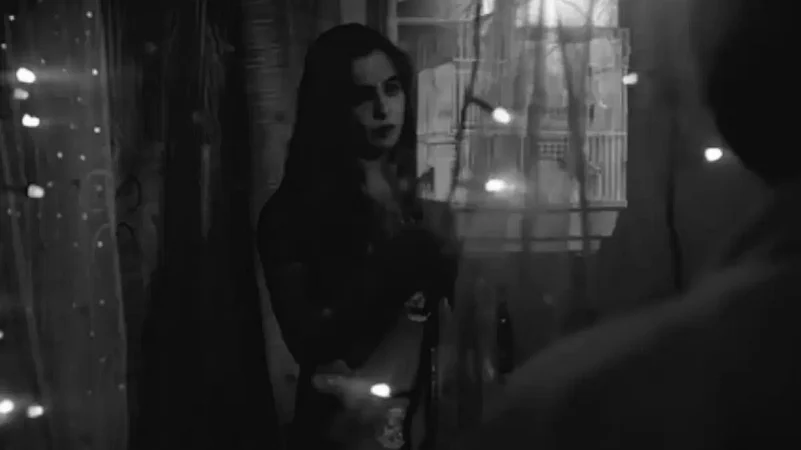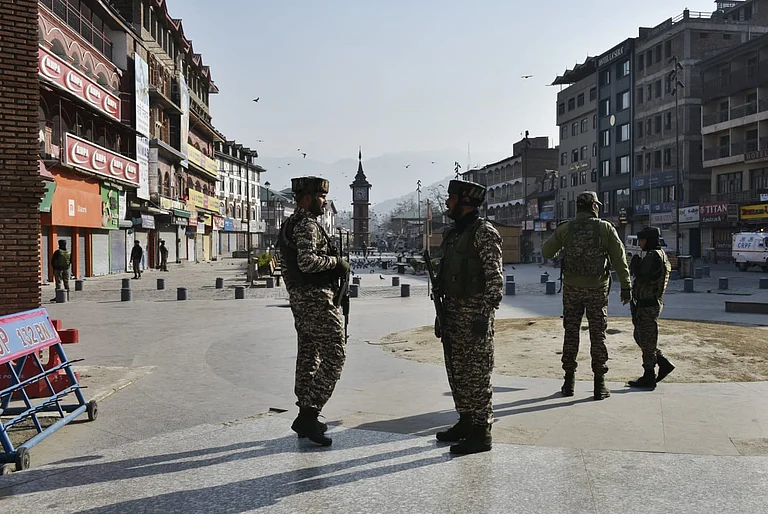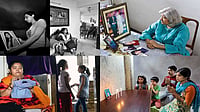Trigger warning: The story deals with themes of suicide and sexual assault.
Wrapped in a thin sheet —a feeble defence against the chilling winds that swept through the balcony— she lay huddled in the farthest corner of the bed. Fingers trembling, she reached out for a thin volume, ‘Manto Ki Kahaniyan’, resting on a nearby stool. The unforgiving winds were piercing ice needles into her skin while fluttering the pages of the book in her hand. She decided to read the fourth story ‘Hatak’.
Crawling a few lines into the book, she realised that the winds had surrendered. Or perhaps, they hadn’t. Perhaps, the words were turning her numb. In regular stories, the characters happen to talk to one another. But then, there are stories which dare to talk to the reader. The sharpest stories are those which tumble down the pages like drops of blood and make a pool on the floor. From that red pool, rises up a giant mirror peeking into your very soul. That is how the most powerful stories talk to their readers. Also, the most dangerous ones.
But we cannot blame just the story, she was no less. Who had forced her to talk to the stories and the worlds they unfurled? But then, what choice remains when your heart aches and all attempts at healing prove futile? In such moments, the heart, wounded and weary, forsakes its quest for solace and instead seeks out fresh wounds. In those moments, her heart craved to find fresh hells wrapped in the spaces between those inked words:
"Every night her visitor, new or old, would say to her, Sogandhi, I love you. And Sogandhi, despite knowing that he was lying to her, would melt and feel as if she was really being loved. Love. Oh, what a glorious word it is! She wanted to melt it and massage herself with it so that it permeated all the pores of her body. Or, maybe, she could go inside of it. Squeeze herself inside of it and then close the lid. At times, when the desire to love and be loved would grow too intense inside of her, she would feel like putting the man lying next to her in her lap, patting him, singing him lullabies, lulling him to sleep… Those who are unable to have pure gold make do with fool’s gold."
In her tale, she was a well-read woman, a fervent political activist, and a staunch feminist, expected to discern what was right for her. Yet, she was finding herself shackled by the same chains, smothered by the same yearnings as that of Sogandhi — the sex worker in the story. Her heart ached to be respected and cherished for the beauty of her heart and the brilliance of her mind. She longed for a love that transcended the mere physical, for an affection that saw her as more than a vessel to sate a ravenous appetite.
Holding that book, she travelled to the day in kindergarten when she was boarding the school bus and the conductor bhaiya smiled and called her to his seat. Seeing all the other kids fight over seats, she felt special and immediately ran to him. He made her stand in front of him. Within minutes, just as the bus took a turn into a dark tunnel, he slid his hands into her bloomers and started touching her, his fingers rolling around in search of meat to pluck.
For a fleeting moment, she remained oblivious that it was bhaiya’s hand. But as she lowered her gaze and caught sight of his triumphant smile, she found herself plunging into an icy tundra. It was a freezing moment, one that seemed to thrust her into a stifling abyss, yet left her porous enough to be painfully aware of the thousand needles pricking into her genitals.
That day she realised that not all offensive touches make you angry, not all of them make you shudder, some unsettle you in the most cunning and painful ways. They freeze you to the bone and fill your nerves with molten lava. You dangle between a dead numbness and an absolute awareness. With pointed nails, they scratch and pull out the skin of your soul and leave your naked wounds out in the open for every chilling wind to remind you of what happened to your skin and your soul. They rub a million chillies in your eyes and forbid you from weeping. They hijack the basic human reflexes. You want to react but you suddenly forget how to.
With bruises all over, that day, she dragged her heart to the school. And when bhaiya set her free, he smiled again, proud of his triumph. His nails had pulled out their trophies. Her skin was lying dead on his nails. He looked at her and said, “Kal phir aana.” (Come again tomorrow).
Years later, when she gazed into the book on the winter night, those three words somehow entered the pages and slapped her hard. Frightened, she slammed the book shut and screwed her eyes up. The words echoed around in her sleep and she knew the world was asking her to come again. Come again to be scratched. To be peeled. To be stabbed. To be smashed. And, to be crushed.
Behind those haunting echoes, there came a whisper, the tender voice of a little girl that carried with it the painful memories of the torment her body had borne, the scars etched upon her skin, and the fractures that had marred her very soul. A dark cover of her haunting past —a series of rapes and child abuse— descended upon her, each incident pressing upon her mind like a relentless tide, threatening to engulf and drown her in its sombre depths. She longed to shut out the voices and seal her ears to the world, but it was not calling from outside. It was as though the little girl dwelled deep within her. Perhaps, like her own daughter. Or a reflection of her own battered self.
She dragged her steps to the bag where her medicines were kept and took out her antidepressants. With her throat tightening with grief, she swallowed the pills in, chasing their bitter taste with gulps of water. Moments of despair gripped her, causing her to retch, expelling some pills onto the floor, only for her to retrieve the sodden remnants and swallow them once more. Then, she lay down, waiting for the world to surrender its relentless grip. In that stillness, a question arose from the depths of her being, a question she couldn’ quite fathom the source of, “So, is this the end?”
Her memory doesn’t hold what happened thereafter. She remembers opening her eyes in an ICU amid the doctors around her pushing tubes into her nose, her mouth and her urethra to remove all the toxins from her system. She was still drowsy when one of the doctors asked, “How many tablets?” To this, she answered, “Thirty-eight.” The doctor almost laughed at the preciseness of the answer and then immediately shut up, perhaps, ashamed. To her father sitting next to her bed, she whispered, “Please bring me the book I left on my bed ‘Manto Ki Kahaniya’.” She insisted that she needed to read it on the hospital bed.
The next day when she woke up and found the book next to her, she opened the page where she had left. And began reading what had happened to Sogandhi.
There still are some days when she shivers from her trauma. But there are many others when she doesn’t. We don’t know her whole story. We don’t know how she dealt with depression. Whether or not she succeeded. She was a writer. A writer of her diary. She knew very well that all stories cannot have grand jubilant endings. But isn't survival, in itself, a triumphant ending? Sometimes to be able to smell hope is the happiest a story can end into.
Her scars, her trauma and the spectre of death remain hidden in many folded pages of her diary and herself. At times, they will still peek out to haunt her. But, that day, she chose life…just like Sogandhi.
(Astha Savyasachi is a Delhi-based journalist who writes on human rights issues who has written for publications like Al Jazeera, The Wire, Scroll.in, and Himal Southasian. Follow the author on Twitter at @SavyasachiAstha.)






















